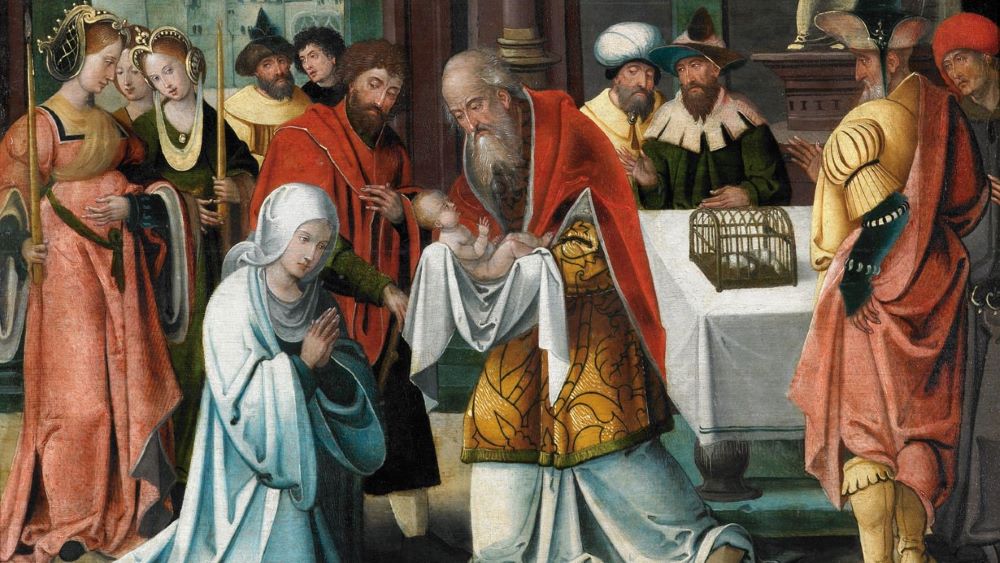
Tomorrow is traditionally the Feast of the Purification of the Blessed Virgin Mary, which is also known as Candlemas. There are references to light in the liturgy and we bless candles.
Candlemas is the conclusion of the Advent/Christmas cycle. We are 40 days from the Nativity of our Lord. The Law required that first-born sons were to be presented, offered in the Temple and the ritual purification of the mother took place. Mary and Joseph fulfilled the Law and encountered the prophetess Anna and old Simeon, who had been awaiting the Messiah. Simeon takes the Child in his arms and pronounced his Nunc Dimittis, which we repeat each night at Compline, and told Mary that a “sword” would pierce her heart.
Greek Christians call this Hypapanti or “encounter”, that is, of the young and old, Christ and Simeon, the New covenant and the passing Old.
Liturgically, the Marian Antiphon and response changes. We have been singing Alma Redemptoris Mater since the beginning of Advent. This ends on Candlemas. Hereafter we sing Ave Regina Caelorum through Lent until Spy Wednesday of Holy Week.
Because of the antiquity of the feast, there are many cultural traditions for its celebration. For example, in some French speaking regions it is customary to eat crêpes, in Mexico tamales.
There is some lovely poetry connected to Candlemas, such an evocative day. Robert Herrick has his “Ceremony Upon Candlemas Eve”, the last stanza of which was set to music by Kate Rusby. Christina Georgina Rossetti has her “A Candlemas Dialogue”. St. John Henry Newman wrote a poem “Candlemas”.
Here is “A Song For Simeon”, in free verse, by the greatest poet of the 20th century, T.S. Eliot:
Lord, the Roman hyacinths are blooming in bowls and
The winter sun creeps by the snow hills;
The stubborn season has made stand.
My life is light, waiting for the death wind,
Like a feather on the back of my hand.
Dust in sunlight and memory in corners
Wait for the wind that chills towards the dead land.
Grant us thy peace.
I have walked many years in this city,
Kept faith and fast, provided for the poor,
Have taken and given honour and ease.
There went never any rejected from my door.
Who shall remember my house, where shall live my children’s children
When the time of sorrow is come?
They will take to the goat’s path, and the fox’s home,
Fleeing from the foreign faces and the foreign swords.
Before the time of cords and scourges and lamentation
Grant us thy peace.
Before the stations of the mountain of desolation,
Before the certain hour of maternal sorrow,
Now at this birth season of decease,
Let the Infant, the still unspeaking and unspoken Word,
Grant Israel’s consolation
To one who has eighty years and no to-morrow.
According to thy word,
They shall praise Thee and suffer in every generation
With glory and derision,
Light upon light, mounting the saints’ stair.
Not for me the martyrdom, the ecstasy of thought and prayer,
Not for me the ultimate vision.
Grant me thy peace.
(And a sword shall pierce thy heart,
Thine also).
I am tired with my own life and the lives of those after me,
I am dying in my own death and the deaths of those after me.
Let thy servant depart,
Having seen thy salvation


































Pingback: Canon212 Update: Authoritative Truth? Any Truth At All Would Be Nice. – The Stumbling Block
There seem to be two similarly titled poems by Herrick, of rather different characters.
https://allpoetry.com/Ceremonies-For-Candlemas-Eve
https://allpoetry.com/poem/14327903-Ceremony-Upon-Candlemas-Eve-by-Robert-Herrick
I think as tropes of liturgical/biblical texts go this must get the prize for the longest!
I am not sure one could quite use it for Compline without censure from the Bishop, but it would make a glorious anthem for Holy Hour on this day, if one of your readers were up to a musical setting!
Glorious it is, and a Happy Feast!